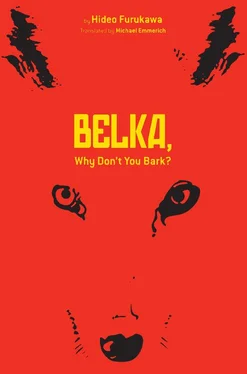The old man was among them.
All beard and moustache.
He listened to the cheering crowds. The man emerged from the building. The reformists’ standard-bearer, the man who stood with the people, who had come to office just two months earlier as the first president of the Russian Federation… of a new Russia that was no longer Soviet—no longer the homeland. His last name began with the letter E .
In the English- and Spanish-speaking worlds, the E became a Y . In German, it became J . It was a J in Dutch as well. In French it remained an E .
This man could change everything, even his initials.
E climbed up onto a T-72 tank stranded among the crowds. The old man watched him, then glanced down at his watch. It was 1:15. The old man watched as E exchanged a few words with the lieutenant in the tank. He read the two men’s lips. Did you come to kill me? E asked. And the lieutenant replied, No.
E was smiling.
The cheering reached a crescendo. The square shook with the chanting: Ura! Ura! Only the old man spoke a different word. “Awful,” he said, “awful.” With only the slightest of gestures, E urged the crowd to be silent and listen. The people understood his body language and, like well-trained dogs, obeyed. The old man, all beard and moustache, kept muttering to himself. “Awful, awful.” E lambasted the reactionary right. E called upon the people to resist. From up there on the tank—rubbing his boots on the tank. The old man glanced at his watch. Soviet time, the homeland’s time, had stopped. It was 1:21 now, but only in Russia.
The old man kept grumbling under his breath. “Awful, awful, awful—the whole thing.” He could see what was coming. Four months down the road. There would be no Soviet Union. E would have destroyed it. He wouldn’t be picky about how he accomplished this, anything would suit him as long as the Union was destroyed. And it wasn’t only the Union. At the same time, E would have brought something else, something much larger, to an end.
The dogs set fires. The fires were a trap. They forced the police to disperse, fan out to different areas of the city. A second area was burning, then a third, then a fourth. The police converged on each of these locations. They searched for the arsonists but couldn’t find them. The arsonists had vanished into the darkness, leaving no traces. Or perhaps they had left footprints, but no one noticed, because they weren’t human. The pads of dog feet, front and back. No one even saw them. Sometimes the dogs remained on the scene, as if they had nothing to do with what had happened, as if they were someone’s pets. Others left and wandered the streets, pretending to be wild dogs. Acting the part of a dumb animal was all it took—people were deceived. The dogs climbed trees, if there were any nearby, and hid in the foliage. The arsonists’ targets were bases for organized crime, so when the fires started, members of the gangs would come running out, ready to fight. Who did this? Who’s responsible? What group is it? Reports had been flying back and forth since shortly after noon, so they were ready to give chase. They set out to catch whoever it was. And then the dogs, concealed in the leaves of the trees, would leap down on them, and the men would die. By the time the fourth blaze had been brought under control, people were panicking over the sixth. All the fire engines were out on call.
Attacks were launched simultaneously on all the casinos.
The banks were targeted. Sirens wailed endlessly late at night. You could hear them outside, echoing down the streets. Until the police arrived. Or until the mafia who secretly backed the financial institutions got there. Or until dawn broke.
When morning came, the city was enveloped in clouds of black smoke that announced the collapse of order. Arsonists had struck in seventy-two locations; the temperature across the city had risen a full two degrees.
A two-seated motorcycle was driving along the otherwise empty highway. The speedometer remained fixed at forty miles per hour. Two middle-aged women were riding it. The one gripping the handlebars looked just like the one sitting behind her. The two Slavic sisters that Strelka called WO and WT.
A large posse ran behind the motorcycle.
Down the highway. Incredibly fast.
Eight o’clock in the morning. Before people headed to work. The dogs following the motorcycle split into two groups, one going right and the other left. Then they spilt into four, one for each direction.
Also at 8:00 AM: Strelka woke up.
As she stirred, the seven dogs around her lifted their heads. They had been sleeping in the garage of a mafia estate they had taken. The old lady wasn’t there. She was inside, in the kitchen. Making breakfast for Strelka and the seven dogs.
Did you sleep? Strelka asked her dogs.
WE SLEPT, they answered.
DID YOU DREAM? Strelka asked Belka.
NO, Belka replied.
I FEEL LIKE I DID. I WAS X YEARS OLD, I THINK, AND HUMAN. FUNNY TO DREAM THAT, SINCE I’M A DOG.
TIRED, HUH? Belka licked Strelka’s face. His tongue was soft.
WE’LL ERASE HUMAN TIME, Strelka said. ERASE IT, AND MAKE IT… MAKE THIS…
WHAT? Belka asked.
WHAT YEAR WILL IT BE? the other six dogs asked.
“A year for dogs. The year nineteen-ninety… X,” Strelka said. “For starters.”
LET’S DO IT! barked Belka.
He barked. Already Strelka and the six other dogs were on their feet. They sensed something. But it was over. By then a sort of phut had sounded—a gun with a silencer. Outside the garage. A mafia fighter lay on the ground. Moaning. Twice more: phut , phut . And then the old lady appeared in the door to the garage, gun in hand.
“Breakfast is ready,” she said. In Russian.
Strelka’s face remained blank for a moment; then, slowly, slowly, she began to smile.
“You meant ‘breakfast’?” she said in Japanese. “For us.”
1991. Moscow in the autumn. The old man was crazy. He listened intently to the military radio transmissions he intercepted. He played with money. He killed. Russians, Armenians, Georgians, Chechens. He fooled around with mounds of banknotes: rubles, US dollars. He was living in an abandoned building. It stood on the outskirts of Moscow, near a garbage dump. For some reason, people were throwing away huge quantities of meat and vegetables. In secret. To control how much went to market. The dump was a sort of graveyard, suspended between the controlled economy and the free-market economy.
The old man stared down at the dump from a paneless window. Sometimes he’d stare at it all day long. People came to pick over the trash. Housewives plowed through it, collecting cabbages. Ignoring the rotting meat. Meat on the verge of rotting… they grabbed. There were old men too, and people out of work, and alcoholics. They took bars of soap. They took empty bottles, which they exchanged for two or three rubles at the recycle center. They picked up old clothes to sell on the black market. The old man watched a man dig up a tattered red flag someone had thrown away, then throw it away again.
In the eyes of the scavengers that autumn, the old man hovering by the window of the abandoned building looked like a ghost. His beard and moustache had been left to grow until his cheeks, his chin, his upper lip were buried in white. Look at him—he is a ghost, lower than the scavengers themselves. So they ignored him.
Earlier, near the end of summer, someone noticed him.
A burglar had broken into his apartment and tried to steal the only thing he had left in his possession. Fucking stinks in here , the burglar said as he scanned the room. He went over and reached out to it. The globe. A second later he was dead. The old man had killed him. The burglar had brought a knife. The knife was stuck in the burglar’s heart.
Читать дальше












